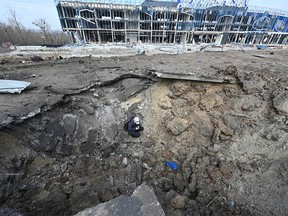Derek H. Burney: America must stop dithering on Ukraine — for all our sakes
Procrastination by western allies is putting global democracy at risk

Article content
As the U.S. Congress continues to dither unconscionably over the funding of additional military assistance for Ukraine, that nation’s fate, and its aspirations for an independent, democratic future hang perilously in the balance. So, too, do the entire fortunes of Europe.
Sensing U.S. and western weakness, Russian President Vladimir Putin is upping the ante, more than doubling the number of troops committed to the invasion of Ukraine, increasing munitions manufacturing — an estimated seven times faster than the West — and exploiting influence and weaponry from such unsavoury partners as China, Iran and North Korea. Economic sanctions deployed against Russia are better known for the degree to which they are ignored than for any notable success.
The U.S. approach to Ukraine has been ambivalent, described by Keith Naughton in The Hill as, “a floating craps game of diplomacy and incoherent military strategy.” Instead of supplying resources that Ukraine needs to win, the U.S. has doled out less than Ukraine needs to survive. “Too little too late” has been the common refrain. Last fall, according to the German tabloid Bild, there were rumours that Germany and the U.S. would force Ukraine into peace talks this year by refusing to provide weapons needed for victory. The allies are frightened by Putin’s deceptive “red lines” and cling naively to the notion that he would accept reasonable concessions for peace and then honour them. As if?
Squishy ambivalence is undermining American public support for the war and has prompted Putin to threaten to use tactical nuclear weapons against Ukraine. Even more bizarrely, the Russian president tried to blame Kyiv for the lethal ISIS-K attack on a Moscow concert hall.
Ukraine is outgunned and outmanned. The most urgent priority is artillery, air defence missiles, deep-strike rockets and other vital weaponry to help blunt the surging Russian spring offensive. The longer-term issue is how to help Ukraine ensure its future — a question NATO leaders should address at their 75th anniversary meeting this July in Washington, before Putin decides to resolve matters himself.
To secure Ukraine’s membership in NATO, the first step is to clarify the democratic and anti-corruption reforms Ukraine must complete and the conditions needed on the ground to enable it to join. It may not be possible to move to NATO membership while hostilities continue as this would lead to a direct confrontation between NATO and Russia. That is, according to Ivo Daalder and Karen Donfried writing in Foreign Affairs, a “gamble most NATO members are not prepared to make.”
At the Washington summit, leaders should agree to invite Ukraine when the fighting ceases, i.e., through a durable ceasefire or armistice agreement. Kyiv need not accept any loss of territory to Russia as permanent, only that any change to the status quo should be achieved politically, not militarily. (When West Germany joined NATO in 1955, Article 5 of its treaty, which states that an attack on one member of the alliance is considered an attack on all members, applied only to its territory. East Germany, including the West Berlin enclave, was excluded until peaceful unification in 1990.) Fundamentally, the U.S. and its allies must act resolutely to convince Moscow that the war against Ukraine is unwinnable.
Pending membership, NATO should take on a more direct role in leading the Ukraine Defense Contact Group — a coalition of 56 countries and the European Union that is meeting regularly to decide which country will provide needed equipment. NATO Secretary General Jens Stoltenberg endorsed this move and is also proposing a US$107-billion military aid package for Ukraine. NATO should work with Ukraine to develop a long-term vision to help build its military into a fully integrated and interoperable force. Equally, NATO could co-ordinate a Ukrainian training mission, a task now scattered inefficiently among several individual members. Pussyfooting about NATO’s involvement only serves Russian objectives.
On the non-military front, attention must also focus on Ukraine’s reconstruction, more acute now given the ruthless Russian attacks on the country’s energy facilities over the Easter weekend. Conservative estimates by the International Monetary Fund and the World Bank put the direct costs from Russia’s wanton attacks on Ukrainian cities and industry at nearly half-a-trillion U.S. dollars. The most efficient and direct way to pay those costs would be to confiscate Russian state holdings in western financial institutions and transfer those funds to Ukraine, as Canada and others have urged. But the Europeans worry that the Russians would retaliate by confiscating European holdings in Russia, affecting their own financial institutions.
Attention is now shifting to Plan B to pay for Ukraine’s reconstruction. An initiative slowly gathering steam, proposed by the World Refugee & Migration Council, would establish a SPV (Special Purpose Vehicle) to issue bonds backed by assets held in western financial institutions, to help rebuild Ukraine’s shattered infrastructure and bolster its economy. According to Bloomberg, the G7 will consider in June a proposal to issue at least US$50 billion of bonds backed by profits generated from frozen Russian sovereign assets and commit the proceeds to Ukraine. A total of US$280 billion of Russian central bank assets frozen by the U.S. and the EU would be pooled in the SPV, the profits from which would back the “freedom” bonds. To make the bonds attractive to private investors, key Western governments would first have to agree to purchase some bonds themselves.
This SPV mechanism would avoid the legal and political risks posed by direct confiscation although nervous Europeans still worry about biting the bullet because of pro-Russian elements in their own domestic constituencies.
Canadian Finance Minister Chrystia Freeland and U.S. Treasury Secretary Janet Yellen are collaborating closely to gain support for this initiative.
Time is of the essence and the stakes are critical for both military and financial assistance. Decisive action by the U.S. and its allies is the only way to convince Putin that he will not outlast western support for Ukraine. The war has triggered a fierce Ukrainian nationalism that few had predicted. Ukraine’s sacrifices should not be for naught.
What is certain is that, if the West and its allies procrastinate further on desperately needed assistance, Ukraine will lose the war, and the threat to European security will become acute. Flaccid behaviour by democracies will embolden bad actors everywhere.
National Post
Derek H. Burney is a former 30-year career diplomat who served as Ambassador to the United States of America from 1989-1993.













Postmedia is committed to maintaining a lively but civil forum for discussion. Please keep comments relevant and respectful. Comments may take up to an hour to appear on the site. You will receive an email if there is a reply to your comment, an update to a thread you follow or if a user you follow comments. Visit our Community Guidelines for more information.